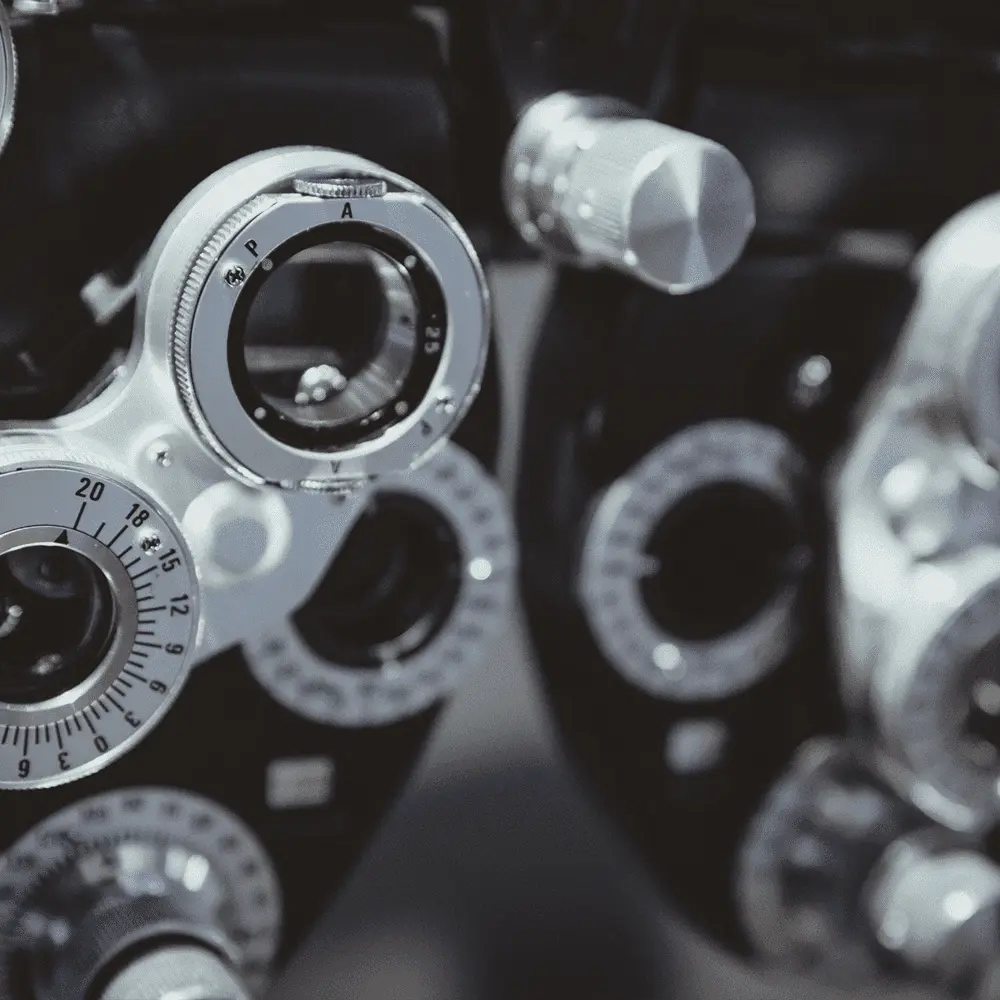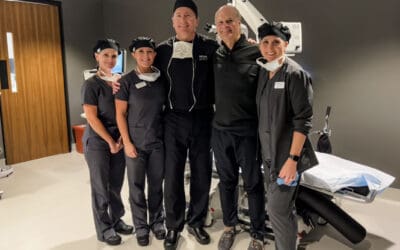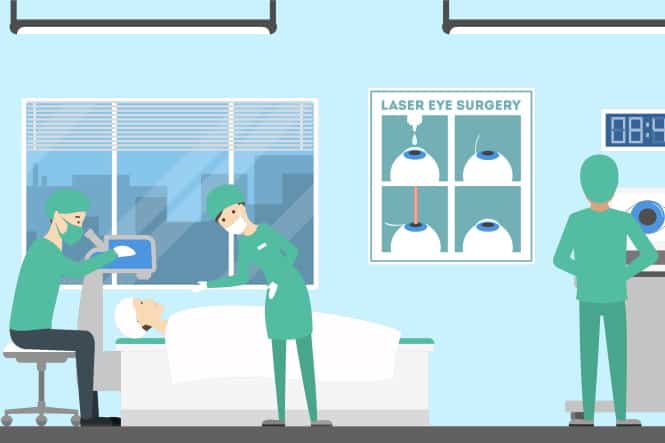Refractive Lens Exchange
Experience sharp vision at any distance with Refractive Lens Exchange
Imagine a life free from the frustration of readers, bifocals, and blurry vision. With Refractive Lens Exchange (RLE), this can be a reality. Tailored for individuals over 40, RLE effectively addresses the natural vision changes that come with aging, as well as common vision conditions such as nearsightedness, farsightedness, and astigmatism.
For Treating
Nearsightedness, Farsightedness, Astigmatism, & Presbyopia
“After Refractive Lens Exchange, my vision is incredibly sharp. Think of an HDTV vs. an older model."
– Lucy

Is it Right for You?
Refractive Lens Exchange is an ideal solution for those experiencing a decline in near vision, also known as presbyopia. This change occurs in addition to any vision conditions already present including nearsightedness, farsightedness, and astigmatism. Symptoms of presbyopia include:
- Difficulty reading or seeing in dim light
- An inability to focus on near objects
- Difficulty driving, especially at night
How it Works
During RLE the natural, dysfunctional lens is removed and replaced with an advanced intraocular lens customized to your vision and lifestyle. This four-in-one procedure helps with distance and near vision, stabilizes the lens optics, and eliminates future cataract surgery.
Consider it the ultimate anti-aging solution for your eyes.
What to Expect
Refractive Lens Exchange is a 10-15 minute outpatient procedure
Both eyes are typically done on the same day or up to a week apart
After the one-day post-op, patients can typically return to their regular daily activities, with a few restrictions
Patients can anticipate significant visual improvement in the following days
During the following weeks, patients will use antibiotic and anti-inflammatory eye drops
Our doctors follow our patients' recovery with regular post-op visits throughout the year following surgery.
Benefits of Refractive Lens Exchange
Improved Vision
RLE delivers clear vision at a range of distances
Enhance Lifestyle
Without readers and bifocals getting in the way, RLE better accommodates an active lifestyle
Save Money
No more wasting money on expensive bifocals year after year
Prevent Cataracts
RLE eliminates the need for future cataract surgery
Refractive Lens Exchange FAQs
What causes near vision loss?
Your natural lens acts like the zoom function in a camera, allowing you to focus on things up close. As we age, the lens progressively loses that ability and results in the need for reading glasses or bifocals. Another factor is the development of cataracts, which are hard, yellow, and cloudy. Cataracts block and scatter light, and they reduce visual quality, quantity, and color perception. This natural progression is referred to as Dysfunctional Lens Syndrome.
Does the new lens zoom?
We utilize three main categories of lenses to help you achieve distance and near vision after RLE surgery. Your surgeon will discuss these lenses with you and help you choose the best type of lens to meet your vision and lifestyle needs.
What is Presbyopia Correcting?
Presbyopia correcting: These lenses allow the patient to see distance and near/intermediate range in the same eye. They can be used in different combinations to increase the range of vision and reduce the need for reading glasses.
What is Aspheric?
These are monofocal (single focus) lenses that are designed for the best quality of vision at an optimum distance for the patient. Depending on the goals of the patient, there are options regarding where the eye is targeted – distance vision only, near vision only, or blended vision (one eye set for distance; one near).
How does my eye accept the new lens?
The new lenses are made of a specialized acrylic material and don’t move once inside the eye. Unlike glass or metal, the eye will not reject the acrylic lens.
Will RLE prevent macular degeneration?
No. RLE addresses the front of the eye and macular degeneration affects the back of the eye. RLE patients should continue to schedule annual eye exams to check for naturally occurring eye problems such as macular degeneration, glaucoma, retinal degeneration, or detachment.
Should I just wait and have cataract surgery later on?
The decision to have a vision correction procedure is a personal one. Near vision loss and age-related vision changes are inevitable, but the progression varies person to person. With technological advancements and the safety of RLE, many patients are replacing their lenses to help them see better now and avoid any further vision decline as cataracts form or progress.
What are the post-procedure restrictions?
Patients are encouraged to relax immediately following surgery, but are free to resume normal activities as comfort allows. For the first week, they should avoid rubbing or bumping their eye, or getting soap or water in it. For one month following the procedure, they are cautioned against heavy lifting and physical exertion for one month. During that time, they also need to avoid hot tubs, swimming pools, lakes, and oceans.
Get Started with a Free Consultation
Don’t let blurry vision or readers hold you back from enjoying life to the fullest. Schedule a consultation with our expert team today and take the first step towards sharper, clearer vision. Our Advanced Ocular Analysis (AOA) is the first step in determining candidacy for a procedure. Your eyes will be examined using the most advanced diagnostic testing and technologies available. During your consultation, we’ll take the time to understand your unique needs and concerns, and develop a personalized treatment plan for you.
Don’t just take our word for it!
Schedule a Free Consultation
During your free consultation visit, you will meet with an experienced refractive surgeon who will discuss your results along with a custom recommendation for treatment.
Take the LASIK Eligibility Assessment
Are you a candidate for laser vision correction? Let's find out. Take our 60-second online test to see what procedure might be the best option for your vision and lifestyle.
From The Experts At Durrie Vision
Dr. Durrie’s Patient Experience: Refractive Lens Exchange with the Light Adjustable Lens
Renowned Surgeon and Founder of Durrie Vision, Dr. Dan Durrie, Selects Light Adjustable Lens™ for His Procedure Dr. Dan Durrie, retired surgeon and founder of Durrie Vision, dedicated his career to helping people improve their vision and enhance their quality...
How Can I Prevent Cataracts in My Eyes?
And Is There a Laser Vision Correction Procedure to Treat Them in Kansas City? Cataracts negatively affect your vision. If you or a loved one has developed them, then you know how hard they make it to see clearly, especially in dimly-lit environments. As you age, your...
Frequently Asked Questions: LASIK and RLE Laser Vision Correction Procedures
Popular Options for Vision Correction in Kansas City are Available at Durrie Vision LASIK surgery and refractive lens exchange (RLE) are two popular forms of laser vision correction. At Durrie Vision, we analyze patients’ vision and eye health regularly to determine...





